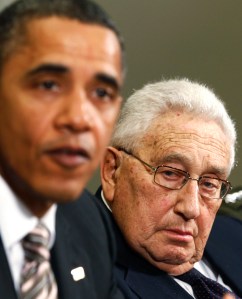
Former Secretary of State Kissinger with Obama
In 2007, four elder U.S. statesmen wrote an Op-Ed in the Wall Street Journal titled “A World Free of Nuclear Weapons.” Former secretaries of State Henry Kissinger and George Shultz, one-time Defense Secretary William Perry and former Senator Sam Nunn (D-Ga.) had, at various times in their careers, been deeply immersed in the nuclear weapons establishment, yet they united in a call to abolish the very weapons they once saw as projections of their nation’s power. Call it penance, or the desire for absolution, but the four horsemen had spoken, and warned of the continuing danger of nuclear apocalypse. (As I have written before, the exchange of even a limited number nuclear weapons would result in sudden and devastating climate change, and therefore the existence of atomic bombs is an environmental–as well as a security–issue.)
Unfortunately, those military and political leaders who still have nuclear weapons at their disposal are less willing to forsake them. And so Kissinger, Shultz, Perry and Nunn are still at it—continuing the steady drumbeat for nuclear disarmament in further Op-Eds at the Journal. One was published this week with the headline “Deterrence in the Age of Nuclear Proliferation.” One can’t help notice that these opinion pieces are becoming increasingly chastened and unambitious as time goes on.
(More on Time.com: See a roundtable discussion with Kissinger, Shultz, Perry and Nunn)
In this piece, the quartet barely make mention of abolition, instead focusing on the more immediate goal of convincing countries to minimize the role of nuclear weapons as a means of deterring attacks from hostile countries (since the cold war, the presence of atomic weapons has been justified on the grounds of deterrence and conflict prevention). But still, there’s some good stuff here.
The text of the Op-Ed can be found here, but the gist of the argument is that deterrence was tolerable (though very risky) in a Cold War context because it essentially involved two actors–the Soviet Union and NATO. But if weapons technology proliferates, “It is not possible to replicate the high-risk stability that prevailed between the two nuclear superpowers during the Cold War. …The growing number of nations with nuclear arms and differing motives, aims and ambitions poses very high and unpredictable risks and increased instability…Does the world want to continue to bet its survival on continued good fortune with a growing number of nuclear nations and adversaries globally?”
The piece goes on to call on America and Russia to set an example by stepping away from the nuclear brink–particularly by taking the bulk of its long-range missiles and bombers off hair-trigger alert, and removing short-range battlefield nuclear weapons from the countries’ arsenals. “”Continued reliance on nuclear weapons as the principal element for deterrence [by the U.S. and Russia] is encouraging, or at least excusing, the spread of nuclear weapons, and will inevitably erode the essential cooperation necessary to avoid proliferation, protect nuclear materials and deal effectively with new threats,” the statesmen wrote.
To which I say: yes sir! The piece also acknowledged that until regional confrontations and conflicts are addressed, new or aspiring nuclear states (read: India/Pakistan; Iran/Israel) will be reluctant to give up their nuclear weapons, so “we must therefore redouble our efforts to resolve these issues.” Again, yes sir!
The inspiring thing about nuclear disarmament efforts is that the spectre of nuclear annihilation can focus minds on making the world a more secure place. Realists and deterrence experts–of which Kissinger was once the doyen–might say that the only way to deter aggression without nuclear weapons is a massive conventional arms build-up. But that is assuming that a world free of nuclear weapons will be the same as it is today. But that can’t be the case. As the four horsemen write, “A world without nuclear weapons will not simply be today’s world minus nuclear weapons.” And thank god for that!
Bold, steady steps toward nuclear disarmament will help foster a more peaceful world by building trust. I am a nuclear abolitionist, but I have no precise idea how the world can get to zero nukes—no one does. Still, if we take urgent and drastic steps to cut global arsenals from the current level of 20,000 to around, say, 1000, we can then reassess. And you know what, we might find that we have created a new reality just by taking this (relatively) simple step. We need to change the global atmosphere—to dream big–precisely because nations currently tend towards distrust and enmity, and it is only major gestures that can overcome that.
And can I allow myself to hope and dream a little further? Can I imagine that in the trust and cooperation fostered by a massive disarmament project, we might find an atmosphere more conducive to tackling other serious global threats, such as climate change?


